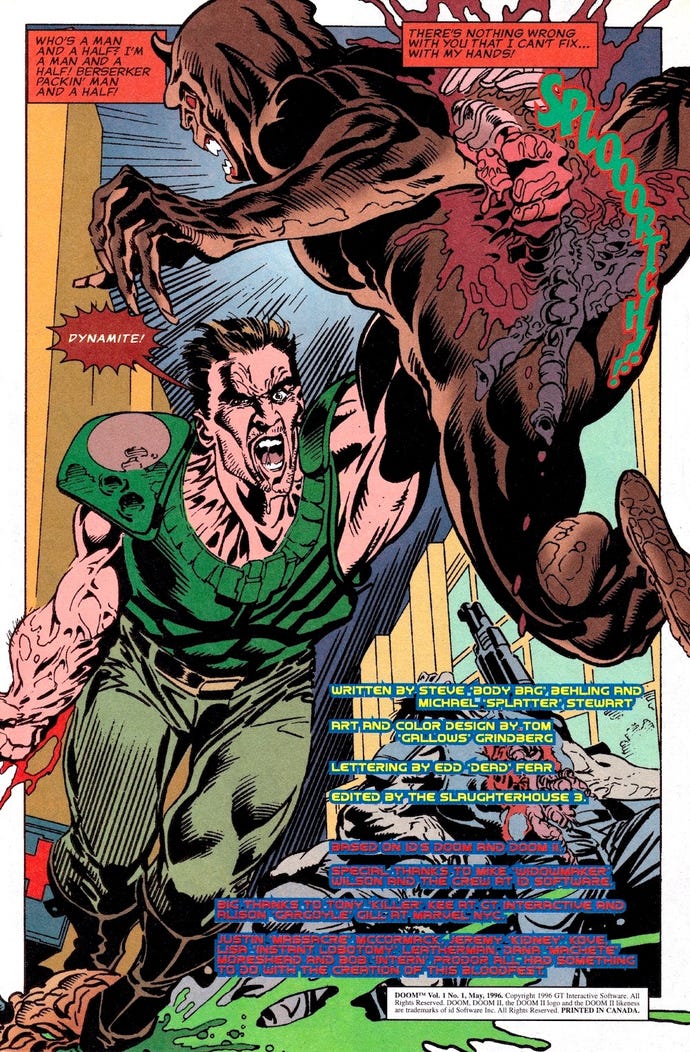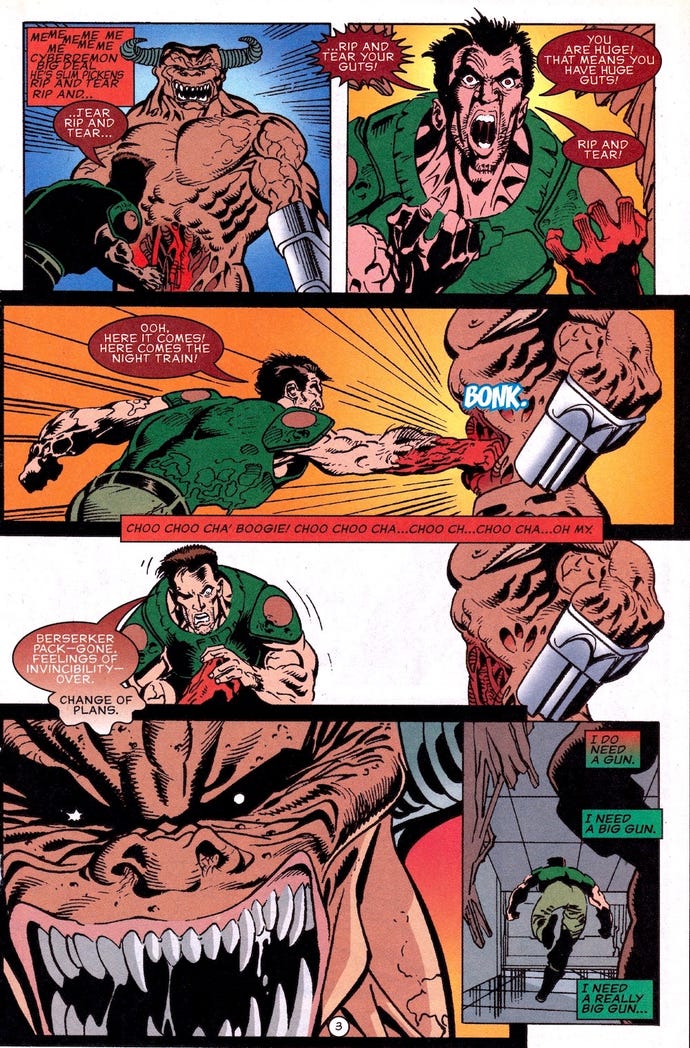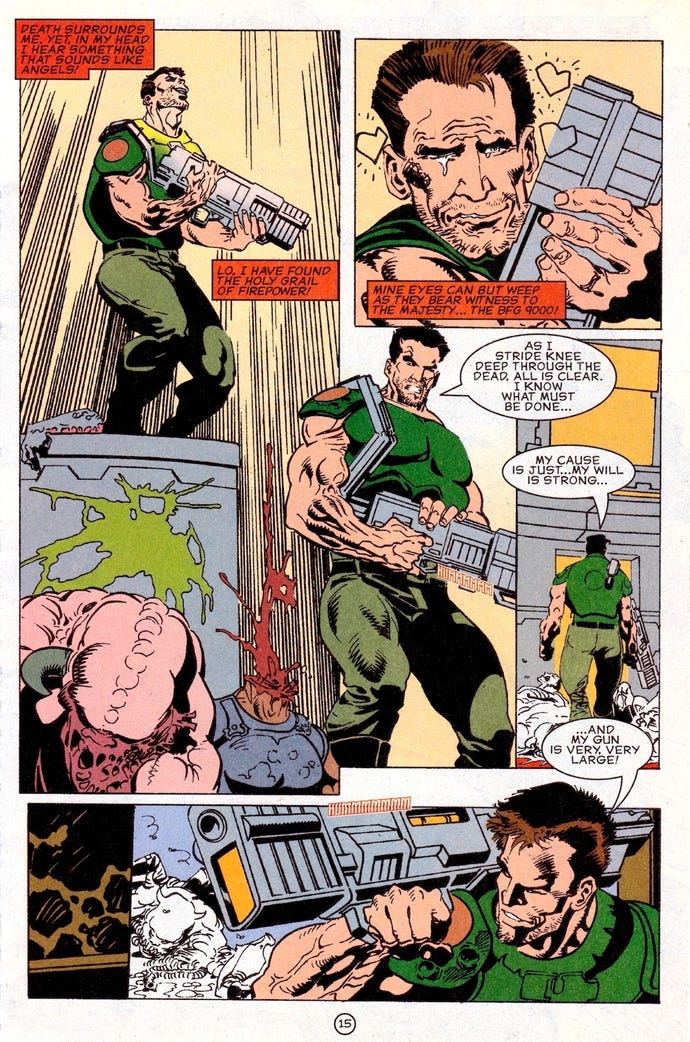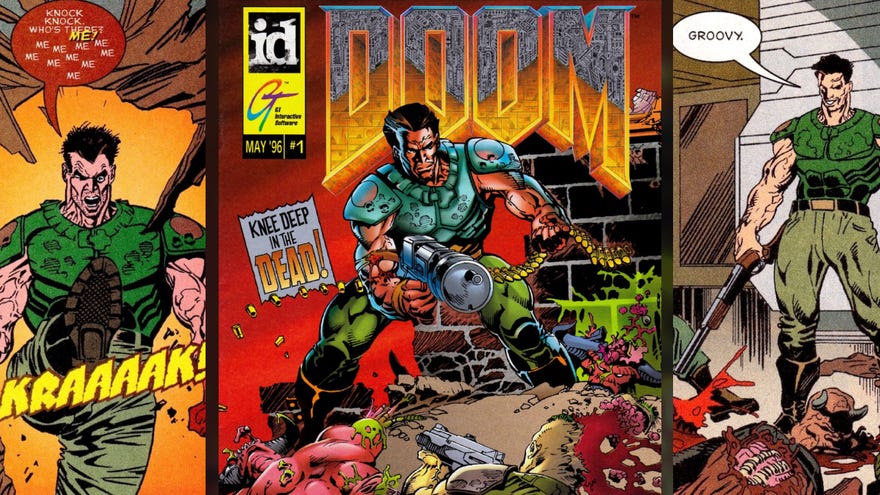Doom At 30: The 1996 Doom comic book is an over-the-top masterwork
"I'M A 12.0 ON THE 10.0 SCALE OF BADNESS!"
"Consider yourself warned! This book contains scenes of graphic violence!" These are the words that adorn the Doom comic book, which was originally released for promotional purposes during 1996's E3 by GT Interactive and Marvel Comics. "Knee-deep in the dead!" is the next bit of text below the logo, referencing the name of the first shareware Doom episode and beautifully describing the blood-soaked cover illustration by Tom Grindberg, who was apparently tickled enough at the thought of drawing this monstrosity to take time away from working on 2000 AD.
The cover is an accurate peek at the gore and demonic entrails that lie within this epic work of sequential storytelling, which required the writing skills of not one, but two gentlemen - Steve "Body Bag" Behling and Michael "Splatter" Stewart. Both Behling and Stewart have a decent body of work between them at Marvel, where they've penned more civilised fare starring the likes of Ant-Man and The Hulk. The Doom comic, in comparison, seems to have been a thing that was written in a fever dream, and DoomWorld, which lovingly hosts scans of this brisk read to this day, describes it appropriately: "Some time in 1996 a couple of guys got together and smoked what was apparently a large amount of crack and then injected pure heroin into their eyes and then proceeded to create what is now known only as 'the Doom comic.'"
That's an accurate summary, but let's not take this the wrong way. Frankly, the Doom comic is an essential read that exemplifies every nutty 90s comic trope imaginable, combining them together in a big wad of Cacodemon excretion wrapped in a bright bowtie. Doomguy talks to himself excessively like every other comic book protagonist of the era, except he comes across as more unhinged, yelling out phrases like "DYNAMITE!" and "NOW I'M RADIOACTIVE! THAT CAN'T BE GOOD!" He's sort of like a modern day streamer, except that no modern day streamer is quite as entertaining, and his best line - "I'M A 12.0 ON THE 10.0 SCALE OF BADNESS!" - is some pure Duke Nukem poetry.

Then there's Doomguy's mission, which is to obtain the raddest gun he can find - the BFG9000. In the beginning of the book, after cleaning Imp spinal fluid from his fists, he declares, "GUNS ARE FOR WUSSES," but promptly changes his mind after his steroids wear off and he's unable to punch his way through a Cyberdemon. Such character development! Once Doomguy acquires said firearm, he lovingly strokes it, cries tears of joy, and hears the sound of angels. Whenever I read this, I'm reminded of Chain Gang War, a similarly nonsensical DC Comics publication from 1993-'94 that featured another testosterone-obsessed dude who also whispered sweet nothings to his gun. All that's missing is a bunch of Rob Liefeld-style pouches on Doomguy, and he surely would've become a towering figurehead of the mid-90s comic book landscape.

The Doom comic's most amazing feat, however, is the cult notoriety it's achieved in the years since its release. Anyone who reads it now is sure to notice that there are some genuinely great depictions of the various enemies and weapons from Doom and Doom II contained within these pages, and - deranged plot aside - there's something about it that manages to capture the breathless anxiety that came with playing an FPS like Doom for the first time. And yes, the lines are truly magical. In fact, this comic coined the phrase "Rip and tear" that's now synonymous with Doom (2016) and Doom Eternal, except here it's uttered by Doomguy as if he's popped a blood vessel while straining on the toilet: "Rip and tear, rip and...TEAR, RIP AND TEAR...RIP AND TEAR YOUR GUTS! YOU ARE HUGE! THAT MEANS YOU HAVE HUGE GUTS! RIP AND TEAR!"
Obviously, id Software recognised that there was good stuff to be found here, even if they did make the correct decision to evolve Doomguy's blatherings into the comparatively Shakespearean "Rip and tear, until it is done." The comic is, quite frankly, so bad that it becomes brilliant, and since 1996 it has spawned everything from dramatic readings to Korean Pokémon parodies. In today's world of meme culture, there is nothing quite so memeable as these panels of Doomguy shrieking at the top of his lungs, which is proof that everyone who worked on this thing was simply ahead of their time.
Perhaps the greatest tragedy of the Doom comic, then, is the fact that it only lasts for 16 pages. Doomguy uses the BFG9000 to blast his final foe to pieces, and then his story comes to an abrupt finish. What other bardic songs did Doomguy have in store for us? After he finally finished ripping and tearing, what hopes and dreams did he possess? Alas, we are denied the chance to read such things, because this was only destined to be an E3 promo comic, and nothing more.

That's why today, as we celebrate Doom's 30th anniversary, it's important to acknowledge the Doom comic and maybe even demand a continuation. Considering that Doom Eternal upped the lore of the franchise to new levels, for better or worse, there's surely plenty of room to sustain a mini-series or even a monthly book. Perhaps messieurs Behling, Stewart, and Grindberg could even be convinced to return, giving us a much needed update on the status of their version of Doomguy, who was last seen standing victorious over the corpse of a Cyberdemon, musing to himself: "It will take a strong man to bring the light of freedom back to this planet. A strong man with the biggest, baddest gun in the world!"
Bless you, 1996 comic book Doomguy with your big gun fetish. Truly, you are the hero we deserve in this troubled age.


